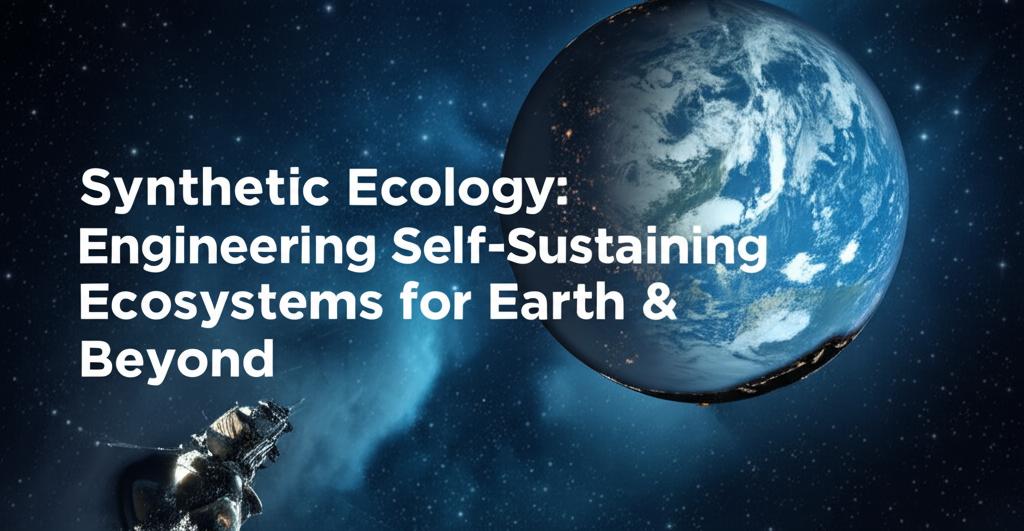Imagine a world meticulously designed, not by nature's slow hand, but by human ingenuity – a world where vibrant, self-sustaining ecosystems are custom-built to thrive, whether in a repurposed desert on Earth or within the metallic confines of a Martian colony. This is the burgeoning realm of synthetic ecology, a field poised to redefine our relationship with the environment and unlock unprecedented possibilities for planetary health and interplanetary expansion.
At its core, synthetic ecology is about the design, construction, and management of novel ecosystems. It’s a sophisticated interplay of ecological principles and cutting-edge synthetic biology, aiming to create resilient, self-regulating biological communities. Think of it as ecological engineering kicked up a notch, where we don't just restore or mimic nature, but actively compose it.
On Earth: Healing and InnovationHere on our home planet, synthetic ecology offers powerful new tools to tackle some of our most pressing environmental challenges. Imagine microbial communities engineered to efficiently degrade stubborn pollutants, revitalizing contaminated soils and waterways. Picture agricultural systems designed with synthetic microbial consortia that enhance crop growth, reduce the need for chemical fertilizers, and even capture more carbon from the atmosphere. These aren't far-fetched fantasies but active areas of research. Scientists are already developing plants genetically modified to grow faster and sequester more carbon, and exploring microorganisms that can break down plastics or produce biofuels with greater efficiency than ever before.
Furthermore, ecological engineering principles, which form a foundation for synthetic ecology, are already demonstrating success in areas like wastewater treatment through constructed wetlands and the creation of green infrastructure in urban environments to enhance biodiversity and climate resilience. These approaches emphasize integrating human activities with natural processes for mutual benefit.
Beyond Earth: Building New WorldsThe applications of synthetic ecology extend far beyond terrestrial concerns. As humanity sets its sights on the Moon, Mars, and beyond, the ability to create closed-loop, self-sustaining life support systems becomes paramount. Imagine engineered algae and bacteria that can efficiently recycle astronaut waste, produce breathable air, and even generate nutritious food in the harsh conditions of space.
NASA and other space agencies are actively investigating how synthetic biology can provide essential resources for space exploration, including food, life support materials, and even pharmaceuticals produced on demand. Experiments are underway to study how organisms like algae and yeast respond to the space environment, paving the way for their use in long-duration missions. The European Space Agency's MELISSA project, for instance, has long aimed to create an artificial ecosystem using microorganisms to process waste and grow food for astronauts. These "ecospheres" could be the key to establishing permanent off-world settlements.
The Frontier of Complexity and EthicsThe path forward in synthetic ecology is not without its hurdles. Engineering entire ecosystems with predictable, stable behavior is an immensely complex undertaking. We are still unraveling the intricate webs of interactions that govern natural ecosystems, and replicating or designing new ones requires a profound understanding of these dynamics.
Moreover, the power to create synthetic life and entire ecosystems brings with it significant ethical considerations. Questions around biosafety – the potential for engineered organisms to escape and interact unpredictably with natural environments – are paramount. Biosecurity concerns, including the potential misuse of these powerful technologies, also demand careful attention and robust regulatory frameworks. Public engagement and transparent discussions about the societal and environmental implications are crucial to ensure responsible innovation.
The Dawn of a New Ecological EraDespite the challenges, the promise of synthetic ecology is undeniable. It represents a paradigm shift, moving from a reactive approach to environmental problems to a proactive, design-based one. By combining the principles of ecology with the power of synthetic biology, we are on the cusp of being able to engineer biological systems with unprecedented precision and purpose.
From healing scarred landscapes on Earth to providing the building blocks for new civilizations in space, synthetic ecology offers a future where humanity and the (engineered) natural world can not only coexist but actively enhance one another. The journey is just beginning, but the potential to cultivate self-sustaining ecosystems tailored to specific needs heralds an exciting and transformative new chapter in our planetary and interplanetary story.

